LCBB4006 - Demonstrating Good Communication Skills in Academic Skills
VerifiedAdded on 2023/06/12
|7
|1826
|87
Report
AI Summary
This report discusses the importance of academic skills in developing good communication skills, both written and oral. It highlights key elements such as active listening, interpersonal skills, negotiation, and persuasion as crucial components of effective communication. The report emphasizes the significance of understanding the audience, setting clear goals, and maintaining a positive outlook to enhance communication abilities. It concludes that mastering these skills is essential for personal and professional success. Desklib provides similar solved assignments and study resources for students.
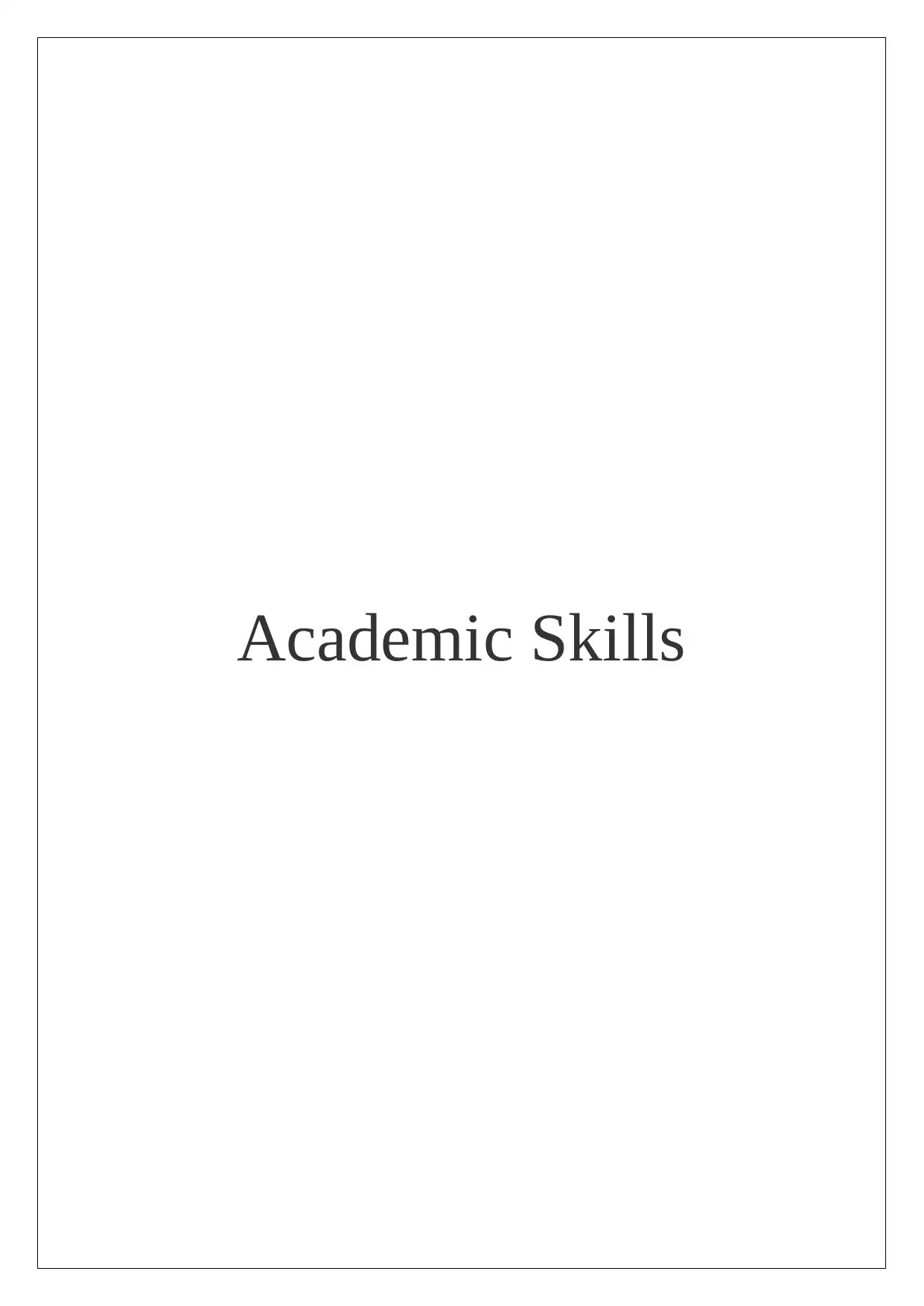
Academic Skills
Paraphrase This Document
Need a fresh take? Get an instant paraphrase of this document with our AI Paraphraser
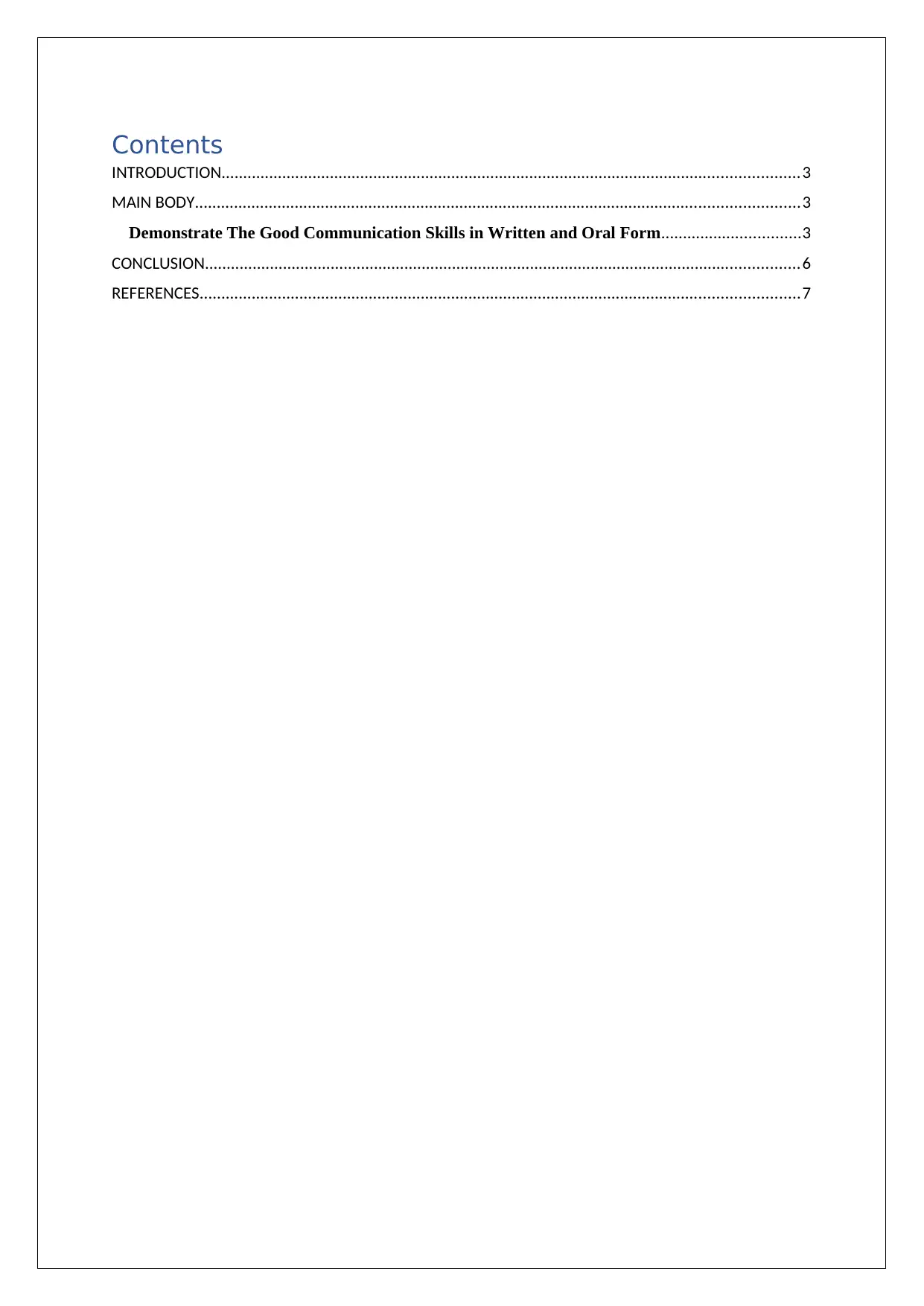
Contents
INTRODUCTION.....................................................................................................................................3
MAIN BODY...........................................................................................................................................3
Demonstrate The Good Communication Skills in Written and Oral Form................................3
CONCLUSION.........................................................................................................................................6
REFERENCES..........................................................................................................................................7
INTRODUCTION.....................................................................................................................................3
MAIN BODY...........................................................................................................................................3
Demonstrate The Good Communication Skills in Written and Oral Form................................3
CONCLUSION.........................................................................................................................................6
REFERENCES..........................................................................................................................................7
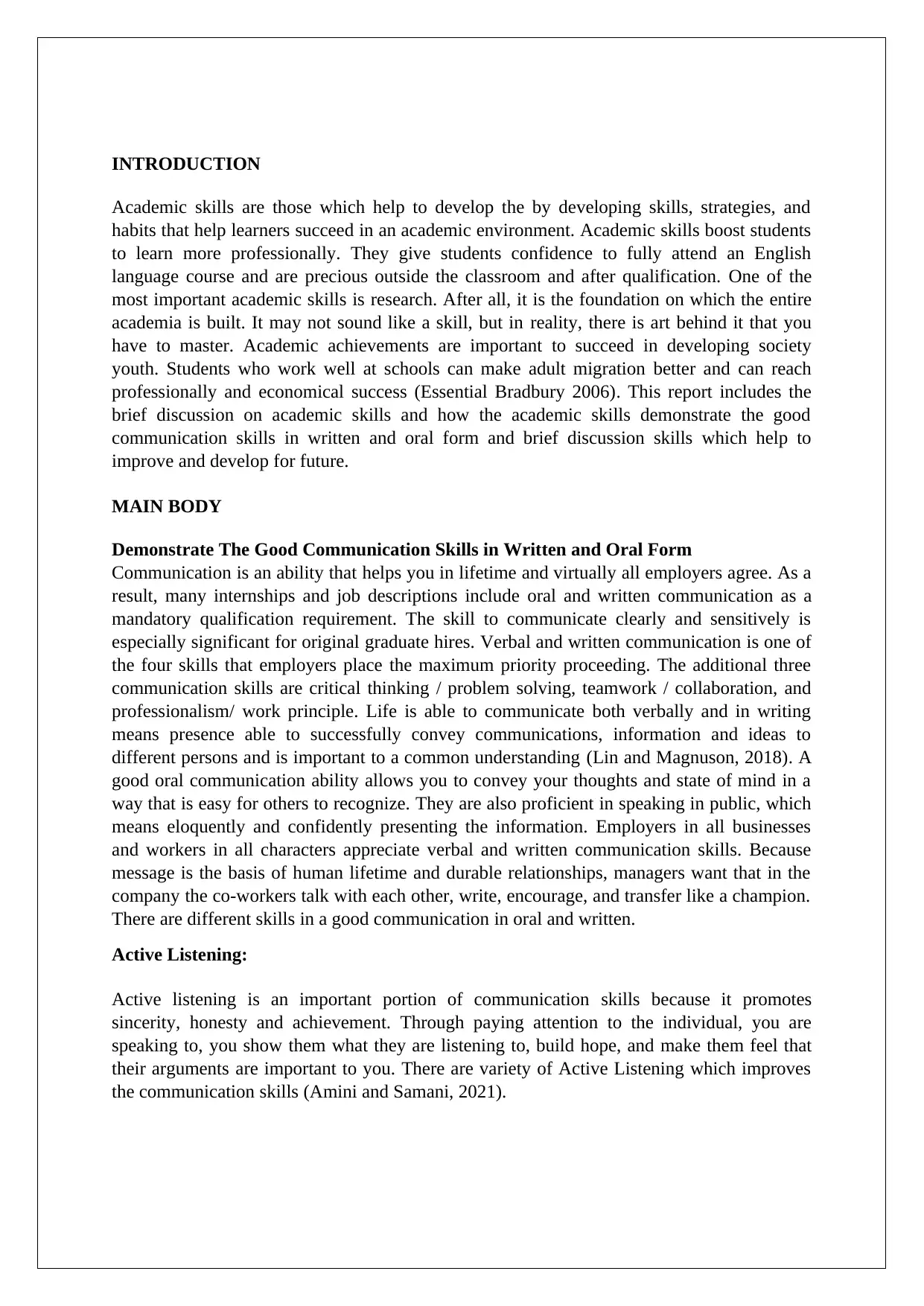
INTRODUCTION
Academic skills are those which help to develop the by developing skills, strategies, and
habits that help learners succeed in an academic environment. Academic skills boost students
to learn more professionally. They give students confidence to fully attend an English
language course and are precious outside the classroom and after qualification. One of the
most important academic skills is research. After all, it is the foundation on which the entire
academia is built. It may not sound like a skill, but in reality, there is art behind it that you
have to master. Academic achievements are important to succeed in developing society
youth. Students who work well at schools can make adult migration better and can reach
professionally and economical success (Essential Bradbury 2006). This report includes the
brief discussion on academic skills and how the academic skills demonstrate the good
communication skills in written and oral form and brief discussion skills which help to
improve and develop for future.
MAIN BODY
Demonstrate The Good Communication Skills in Written and Oral Form
Communication is an ability that helps you in lifetime and virtually all employers agree. As a
result, many internships and job descriptions include oral and written communication as a
mandatory qualification requirement. The skill to communicate clearly and sensitively is
especially significant for original graduate hires. Verbal and written communication is one of
the four skills that employers place the maximum priority proceeding. The additional three
communication skills are critical thinking / problem solving, teamwork / collaboration, and
professionalism/ work principle. Life is able to communicate both verbally and in writing
means presence able to successfully convey communications, information and ideas to
different persons and is important to a common understanding (Lin and Magnuson, 2018). A
good oral communication ability allows you to convey your thoughts and state of mind in a
way that is easy for others to recognize. They are also proficient in speaking in public, which
means eloquently and confidently presenting the information. Employers in all businesses
and workers in all characters appreciate verbal and written communication skills. Because
message is the basis of human lifetime and durable relationships, managers want that in the
company the co-workers talk with each other, write, encourage, and transfer like a champion.
There are different skills in a good communication in oral and written.
Active Listening:
Active listening is an important portion of communication skills because it promotes
sincerity, honesty and achievement. Through paying attention to the individual, you are
speaking to, you show them what they are listening to, build hope, and make them feel that
their arguments are important to you. There are variety of Active Listening which improves
the communication skills (Amini and Samani, 2021).
Academic skills are those which help to develop the by developing skills, strategies, and
habits that help learners succeed in an academic environment. Academic skills boost students
to learn more professionally. They give students confidence to fully attend an English
language course and are precious outside the classroom and after qualification. One of the
most important academic skills is research. After all, it is the foundation on which the entire
academia is built. It may not sound like a skill, but in reality, there is art behind it that you
have to master. Academic achievements are important to succeed in developing society
youth. Students who work well at schools can make adult migration better and can reach
professionally and economical success (Essential Bradbury 2006). This report includes the
brief discussion on academic skills and how the academic skills demonstrate the good
communication skills in written and oral form and brief discussion skills which help to
improve and develop for future.
MAIN BODY
Demonstrate The Good Communication Skills in Written and Oral Form
Communication is an ability that helps you in lifetime and virtually all employers agree. As a
result, many internships and job descriptions include oral and written communication as a
mandatory qualification requirement. The skill to communicate clearly and sensitively is
especially significant for original graduate hires. Verbal and written communication is one of
the four skills that employers place the maximum priority proceeding. The additional three
communication skills are critical thinking / problem solving, teamwork / collaboration, and
professionalism/ work principle. Life is able to communicate both verbally and in writing
means presence able to successfully convey communications, information and ideas to
different persons and is important to a common understanding (Lin and Magnuson, 2018). A
good oral communication ability allows you to convey your thoughts and state of mind in a
way that is easy for others to recognize. They are also proficient in speaking in public, which
means eloquently and confidently presenting the information. Employers in all businesses
and workers in all characters appreciate verbal and written communication skills. Because
message is the basis of human lifetime and durable relationships, managers want that in the
company the co-workers talk with each other, write, encourage, and transfer like a champion.
There are different skills in a good communication in oral and written.
Active Listening:
Active listening is an important portion of communication skills because it promotes
sincerity, honesty and achievement. Through paying attention to the individual, you are
speaking to, you show them what they are listening to, build hope, and make them feel that
their arguments are important to you. There are variety of Active Listening which improves
the communication skills (Amini and Samani, 2021).
⊘ This is a preview!⊘
Do you want full access?
Subscribe today to unlock all pages.

Trusted by 1+ million students worldwide
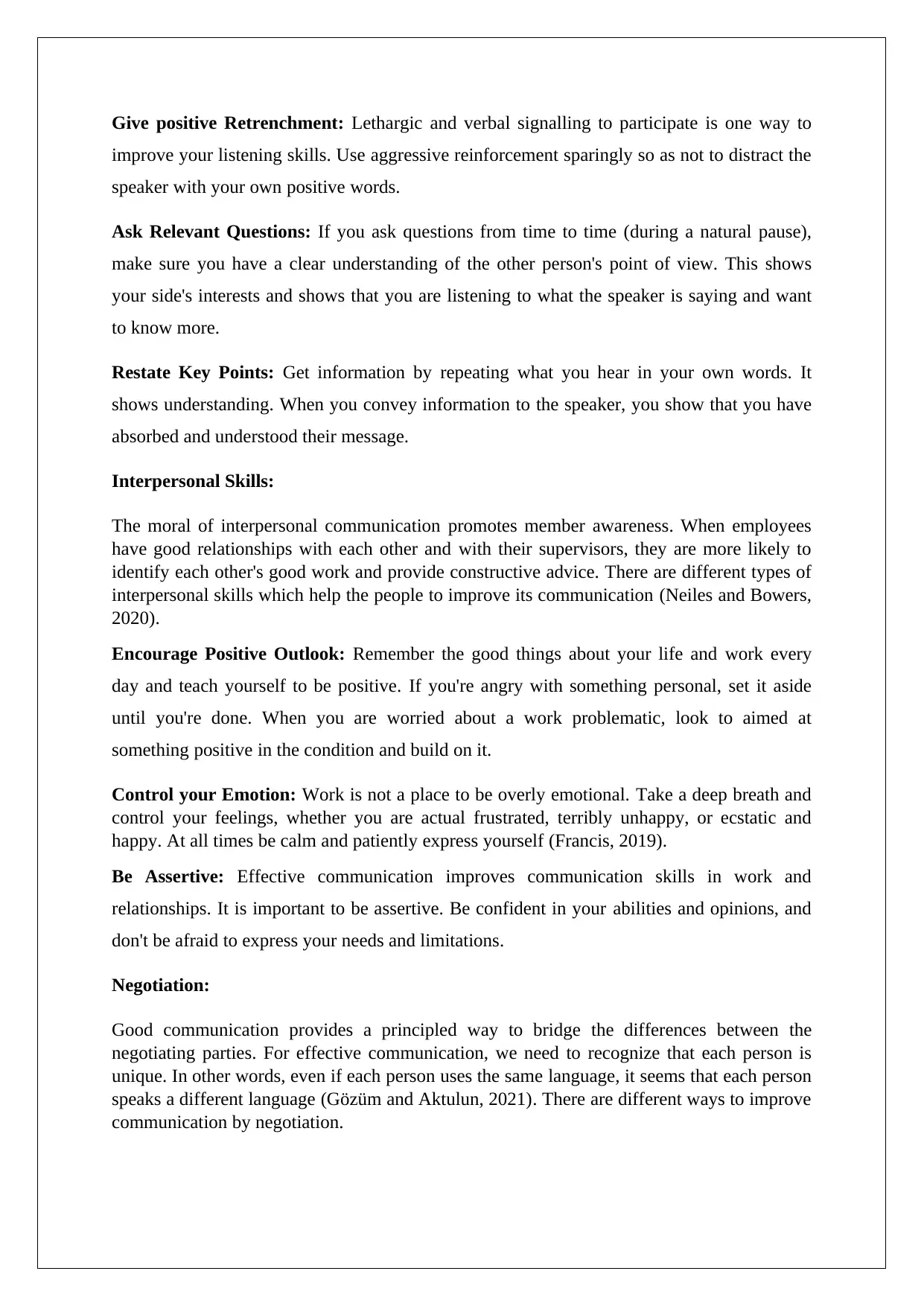
Give positive Retrenchment: Lethargic and verbal signalling to participate is one way to
improve your listening skills. Use aggressive reinforcement sparingly so as not to distract the
speaker with your own positive words.
Ask Relevant Questions: If you ask questions from time to time (during a natural pause),
make sure you have a clear understanding of the other person's point of view. This shows
your side's interests and shows that you are listening to what the speaker is saying and want
to know more.
Restate Key Points: Get information by repeating what you hear in your own words. It
shows understanding. When you convey information to the speaker, you show that you have
absorbed and understood their message.
Interpersonal Skills:
The moral of interpersonal communication promotes member awareness. When employees
have good relationships with each other and with their supervisors, they are more likely to
identify each other's good work and provide constructive advice. There are different types of
interpersonal skills which help the people to improve its communication (Neiles and Bowers,
2020).
Encourage Positive Outlook: Remember the good things about your life and work every
day and teach yourself to be positive. If you're angry with something personal, set it aside
until you're done. When you are worried about a work problematic, look to aimed at
something positive in the condition and build on it.
Control your Emotion: Work is not a place to be overly emotional. Take a deep breath and
control your feelings, whether you are actual frustrated, terribly unhappy, or ecstatic and
happy. At all times be calm and patiently express yourself (Francis, 2019).
Be Assertive: Effective communication improves communication skills in work and
relationships. It is important to be assertive. Be confident in your abilities and opinions, and
don't be afraid to express your needs and limitations.
Negotiation:
Good communication provides a principled way to bridge the differences between the
negotiating parties. For effective communication, we need to recognize that each person is
unique. In other words, even if each person uses the same language, it seems that each person
speaks a different language (Gözüm and Aktulun, 2021). There are different ways to improve
communication by negotiation.
improve your listening skills. Use aggressive reinforcement sparingly so as not to distract the
speaker with your own positive words.
Ask Relevant Questions: If you ask questions from time to time (during a natural pause),
make sure you have a clear understanding of the other person's point of view. This shows
your side's interests and shows that you are listening to what the speaker is saying and want
to know more.
Restate Key Points: Get information by repeating what you hear in your own words. It
shows understanding. When you convey information to the speaker, you show that you have
absorbed and understood their message.
Interpersonal Skills:
The moral of interpersonal communication promotes member awareness. When employees
have good relationships with each other and with their supervisors, they are more likely to
identify each other's good work and provide constructive advice. There are different types of
interpersonal skills which help the people to improve its communication (Neiles and Bowers,
2020).
Encourage Positive Outlook: Remember the good things about your life and work every
day and teach yourself to be positive. If you're angry with something personal, set it aside
until you're done. When you are worried about a work problematic, look to aimed at
something positive in the condition and build on it.
Control your Emotion: Work is not a place to be overly emotional. Take a deep breath and
control your feelings, whether you are actual frustrated, terribly unhappy, or ecstatic and
happy. At all times be calm and patiently express yourself (Francis, 2019).
Be Assertive: Effective communication improves communication skills in work and
relationships. It is important to be assertive. Be confident in your abilities and opinions, and
don't be afraid to express your needs and limitations.
Negotiation:
Good communication provides a principled way to bridge the differences between the
negotiating parties. For effective communication, we need to recognize that each person is
unique. In other words, even if each person uses the same language, it seems that each person
speaks a different language (Gözüm and Aktulun, 2021). There are different ways to improve
communication by negotiation.
Paraphrase This Document
Need a fresh take? Get an instant paraphrase of this document with our AI Paraphraser
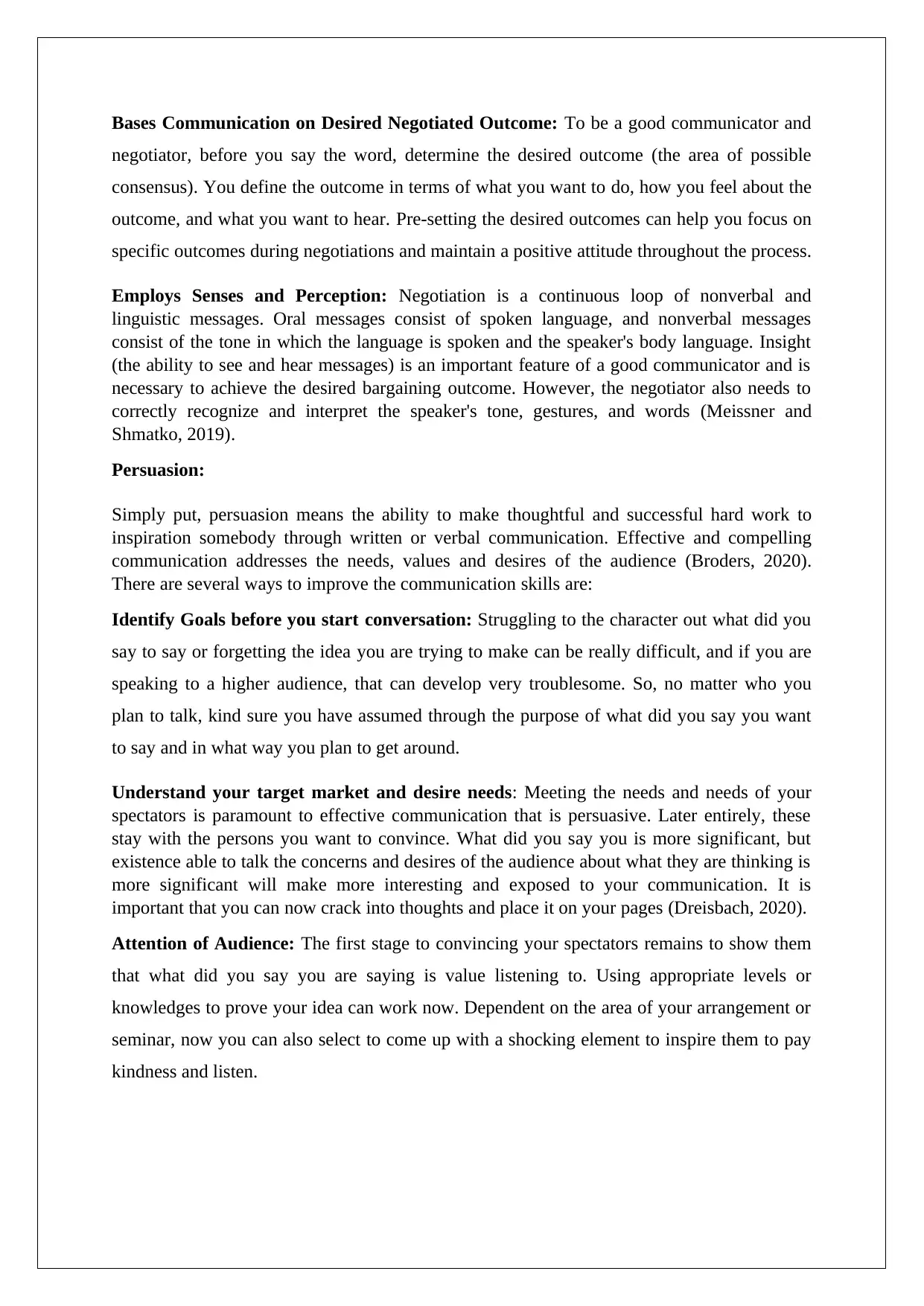
Bases Communication on Desired Negotiated Outcome: To be a good communicator and
negotiator, before you say the word, determine the desired outcome (the area of possible
consensus). You define the outcome in terms of what you want to do, how you feel about the
outcome, and what you want to hear. Pre-setting the desired outcomes can help you focus on
specific outcomes during negotiations and maintain a positive attitude throughout the process.
Employs Senses and Perception: Negotiation is a continuous loop of nonverbal and
linguistic messages. Oral messages consist of spoken language, and nonverbal messages
consist of the tone in which the language is spoken and the speaker's body language. Insight
(the ability to see and hear messages) is an important feature of a good communicator and is
necessary to achieve the desired bargaining outcome. However, the negotiator also needs to
correctly recognize and interpret the speaker's tone, gestures, and words (Meissner and
Shmatko, 2019).
Persuasion:
Simply put, persuasion means the ability to make thoughtful and successful hard work to
inspiration somebody through written or verbal communication. Effective and compelling
communication addresses the needs, values and desires of the audience (Broders, 2020).
There are several ways to improve the communication skills are:
Identify Goals before you start conversation: Struggling to the character out what did you
say to say or forgetting the idea you are trying to make can be really difficult, and if you are
speaking to a higher audience, that can develop very troublesome. So, no matter who you
plan to talk, kind sure you have assumed through the purpose of what did you say you want
to say and in what way you plan to get around.
Understand your target market and desire needs: Meeting the needs and needs of your
spectators is paramount to effective communication that is persuasive. Later entirely, these
stay with the persons you want to convince. What did you say you is more significant, but
existence able to talk the concerns and desires of the audience about what they are thinking is
more significant will make more interesting and exposed to your communication. It is
important that you can now crack into thoughts and place it on your pages (Dreisbach, 2020).
Attention of Audience: The first stage to convincing your spectators remains to show them
that what did you say you are saying is value listening to. Using appropriate levels or
knowledges to prove your idea can work now. Dependent on the area of your arrangement or
seminar, now you can also select to come up with a shocking element to inspire them to pay
kindness and listen.
negotiator, before you say the word, determine the desired outcome (the area of possible
consensus). You define the outcome in terms of what you want to do, how you feel about the
outcome, and what you want to hear. Pre-setting the desired outcomes can help you focus on
specific outcomes during negotiations and maintain a positive attitude throughout the process.
Employs Senses and Perception: Negotiation is a continuous loop of nonverbal and
linguistic messages. Oral messages consist of spoken language, and nonverbal messages
consist of the tone in which the language is spoken and the speaker's body language. Insight
(the ability to see and hear messages) is an important feature of a good communicator and is
necessary to achieve the desired bargaining outcome. However, the negotiator also needs to
correctly recognize and interpret the speaker's tone, gestures, and words (Meissner and
Shmatko, 2019).
Persuasion:
Simply put, persuasion means the ability to make thoughtful and successful hard work to
inspiration somebody through written or verbal communication. Effective and compelling
communication addresses the needs, values and desires of the audience (Broders, 2020).
There are several ways to improve the communication skills are:
Identify Goals before you start conversation: Struggling to the character out what did you
say to say or forgetting the idea you are trying to make can be really difficult, and if you are
speaking to a higher audience, that can develop very troublesome. So, no matter who you
plan to talk, kind sure you have assumed through the purpose of what did you say you want
to say and in what way you plan to get around.
Understand your target market and desire needs: Meeting the needs and needs of your
spectators is paramount to effective communication that is persuasive. Later entirely, these
stay with the persons you want to convince. What did you say you is more significant, but
existence able to talk the concerns and desires of the audience about what they are thinking is
more significant will make more interesting and exposed to your communication. It is
important that you can now crack into thoughts and place it on your pages (Dreisbach, 2020).
Attention of Audience: The first stage to convincing your spectators remains to show them
that what did you say you are saying is value listening to. Using appropriate levels or
knowledges to prove your idea can work now. Dependent on the area of your arrangement or
seminar, now you can also select to come up with a shocking element to inspire them to pay
kindness and listen.
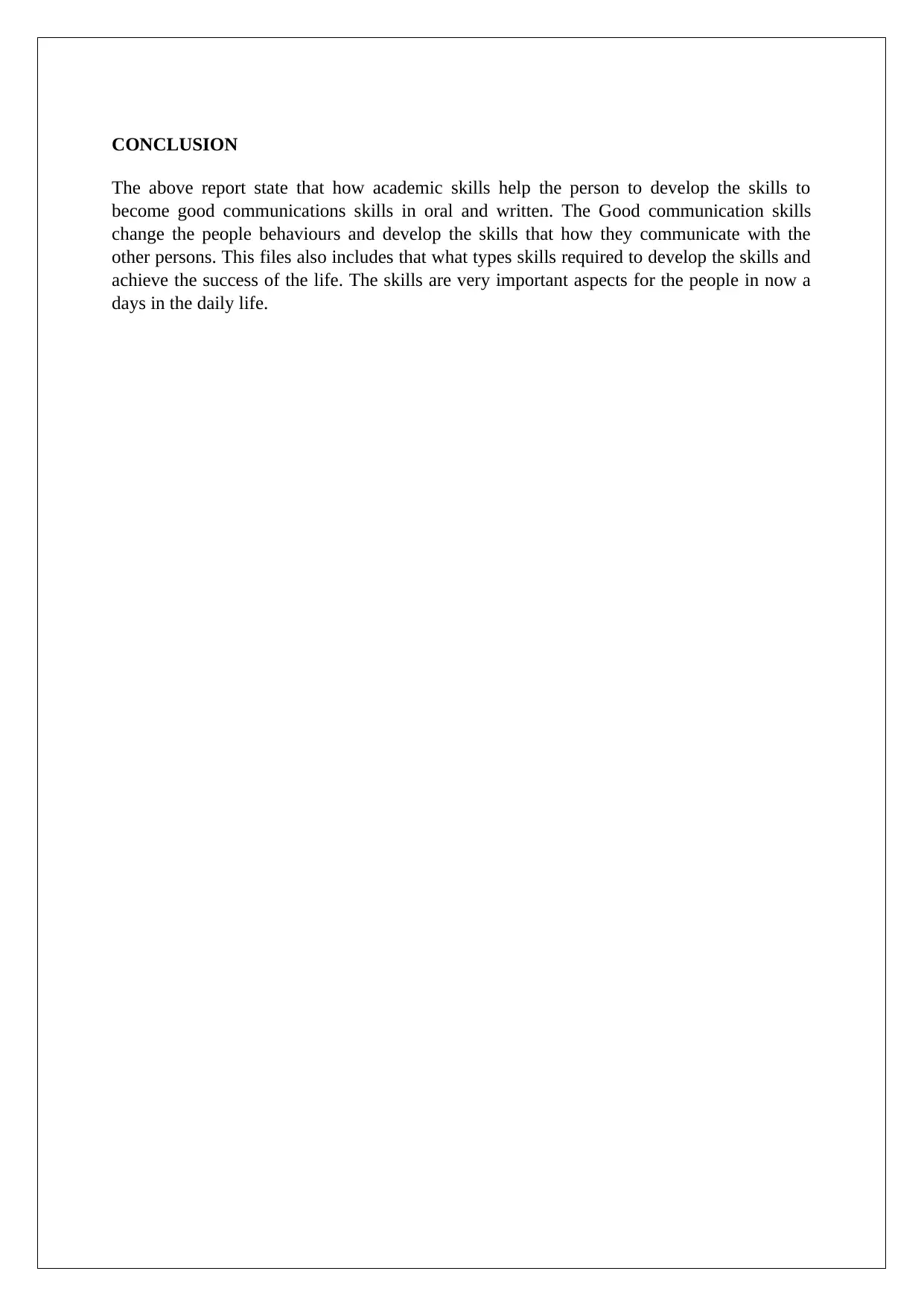
CONCLUSION
The above report state that how academic skills help the person to develop the skills to
become good communications skills in oral and written. The Good communication skills
change the people behaviours and develop the skills that how they communicate with the
other persons. This files also includes that what types skills required to develop the skills and
achieve the success of the life. The skills are very important aspects for the people in now a
days in the daily life.
The above report state that how academic skills help the person to develop the skills to
become good communications skills in oral and written. The Good communication skills
change the people behaviours and develop the skills that how they communicate with the
other persons. This files also includes that what types skills required to develop the skills and
achieve the success of the life. The skills are very important aspects for the people in now a
days in the daily life.
⊘ This is a preview!⊘
Do you want full access?
Subscribe today to unlock all pages.

Trusted by 1+ million students worldwide
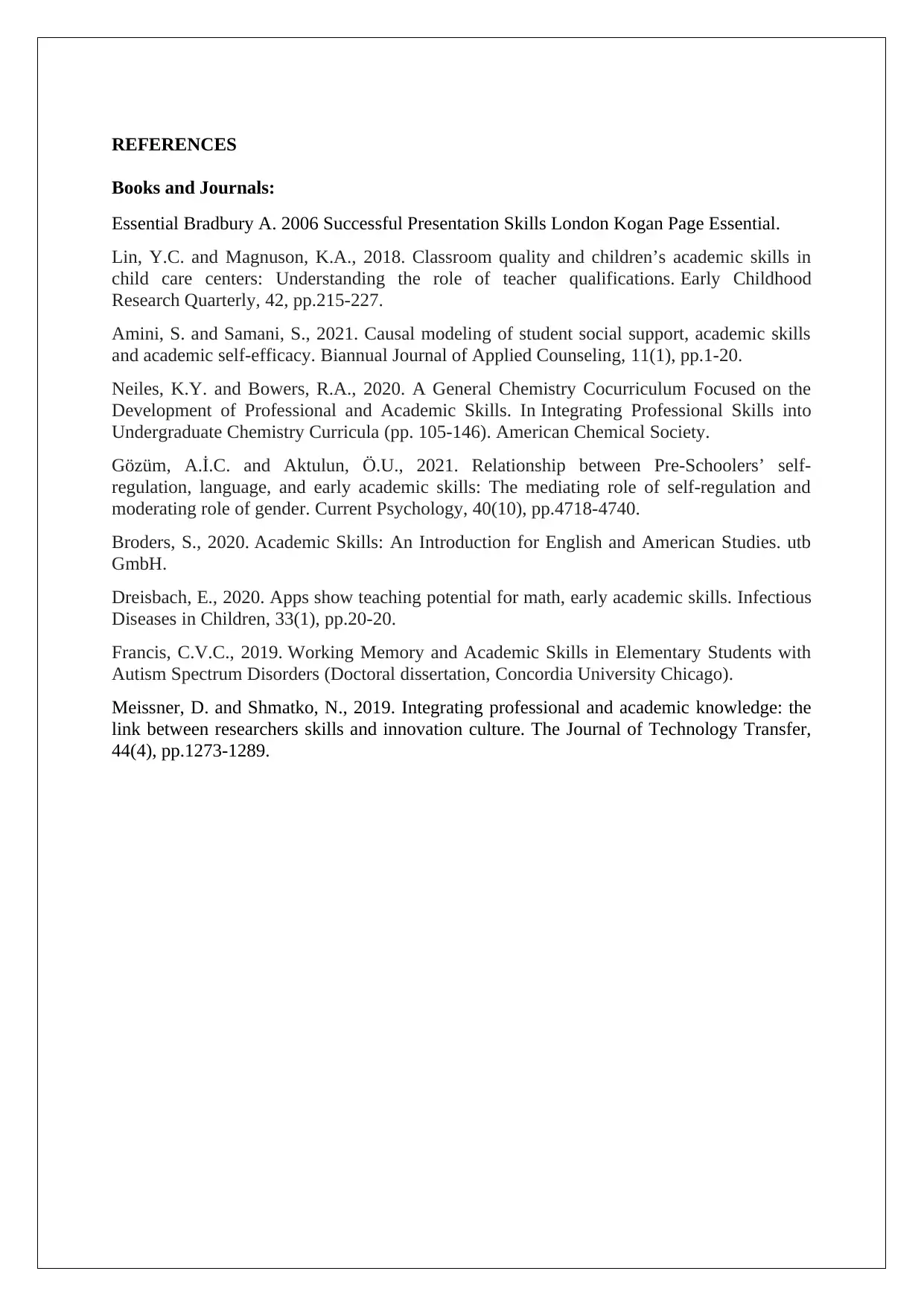
REFERENCES
Books and Journals:
Essential Bradbury A. 2006 Successful Presentation Skills London Kogan Page Essential.
Lin, Y.C. and Magnuson, K.A., 2018. Classroom quality and children’s academic skills in
child care centers: Understanding the role of teacher qualifications. Early Childhood
Research Quarterly, 42, pp.215-227.
Amini, S. and Samani, S., 2021. Causal modeling of student social support, academic skills
and academic self-efficacy. Biannual Journal of Applied Counseling, 11(1), pp.1-20.
Neiles, K.Y. and Bowers, R.A., 2020. A General Chemistry Cocurriculum Focused on the
Development of Professional and Academic Skills. In Integrating Professional Skills into
Undergraduate Chemistry Curricula (pp. 105-146). American Chemical Society.
Gözüm, A.İ.C. and Aktulun, Ö.U., 2021. Relationship between Pre-Schoolers’ self-
regulation, language, and early academic skills: The mediating role of self-regulation and
moderating role of gender. Current Psychology, 40(10), pp.4718-4740.
Broders, S., 2020. Academic Skills: An Introduction for English and American Studies. utb
GmbH.
Dreisbach, E., 2020. Apps show teaching potential for math, early academic skills. Infectious
Diseases in Children, 33(1), pp.20-20.
Francis, C.V.C., 2019. Working Memory and Academic Skills in Elementary Students with
Autism Spectrum Disorders (Doctoral dissertation, Concordia University Chicago).
Meissner, D. and Shmatko, N., 2019. Integrating professional and academic knowledge: the
link between researchers skills and innovation culture. The Journal of Technology Transfer,
44(4), pp.1273-1289.
Books and Journals:
Essential Bradbury A. 2006 Successful Presentation Skills London Kogan Page Essential.
Lin, Y.C. and Magnuson, K.A., 2018. Classroom quality and children’s academic skills in
child care centers: Understanding the role of teacher qualifications. Early Childhood
Research Quarterly, 42, pp.215-227.
Amini, S. and Samani, S., 2021. Causal modeling of student social support, academic skills
and academic self-efficacy. Biannual Journal of Applied Counseling, 11(1), pp.1-20.
Neiles, K.Y. and Bowers, R.A., 2020. A General Chemistry Cocurriculum Focused on the
Development of Professional and Academic Skills. In Integrating Professional Skills into
Undergraduate Chemistry Curricula (pp. 105-146). American Chemical Society.
Gözüm, A.İ.C. and Aktulun, Ö.U., 2021. Relationship between Pre-Schoolers’ self-
regulation, language, and early academic skills: The mediating role of self-regulation and
moderating role of gender. Current Psychology, 40(10), pp.4718-4740.
Broders, S., 2020. Academic Skills: An Introduction for English and American Studies. utb
GmbH.
Dreisbach, E., 2020. Apps show teaching potential for math, early academic skills. Infectious
Diseases in Children, 33(1), pp.20-20.
Francis, C.V.C., 2019. Working Memory and Academic Skills in Elementary Students with
Autism Spectrum Disorders (Doctoral dissertation, Concordia University Chicago).
Meissner, D. and Shmatko, N., 2019. Integrating professional and academic knowledge: the
link between researchers skills and innovation culture. The Journal of Technology Transfer,
44(4), pp.1273-1289.
1 out of 7
Related Documents
Your All-in-One AI-Powered Toolkit for Academic Success.
+13062052269
info@desklib.com
Available 24*7 on WhatsApp / Email
![[object Object]](/_next/static/media/star-bottom.7253800d.svg)
Unlock your academic potential
Copyright © 2020–2025 A2Z Services. All Rights Reserved. Developed and managed by ZUCOL.



